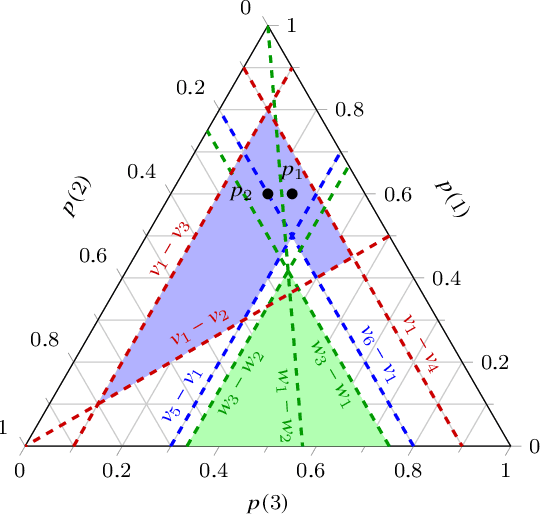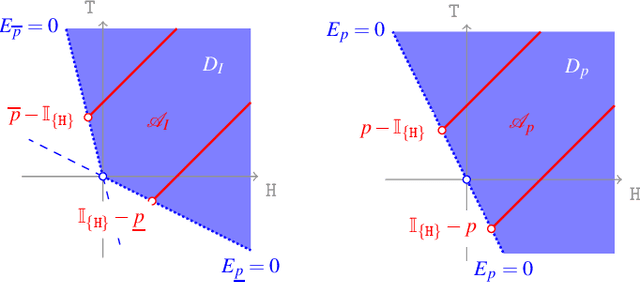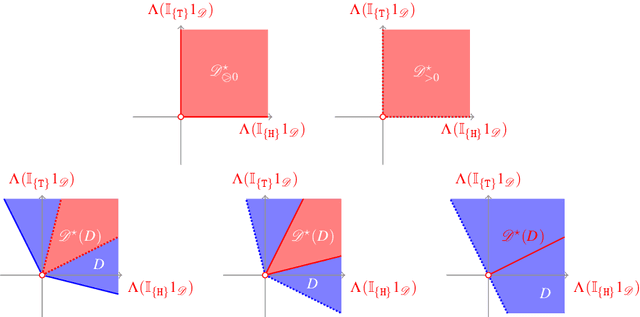Gert de Cooman
Conditioning Accept-Desirability models in the context of AGM-like belief change
Dec 22, 2025Abstract:We discuss conditionalisation for Accept-Desirability models in an abstract decision-making framework, where uncertain rewards live in a general linear space, and events are special projection operators on that linear space. This abstract setting allows us to unify classical and quantum probabilities, and extend them to an imprecise probabilities context. We introduce a new conditioning rule for our Accept-Desirability models, based on the idea that observing an event introduces new indifferences between options. We associate a belief revision operator with our conditioning rule, and investigate which of the AGM axioms for belief revision still hold in our more general framework. We investigate two interesting special cases where all of these axioms are shown to still hold: classical propositional logic and full conditional probabilities.
A decision-theoretic approach to dealing with uncertainty in quantum mechanics
Mar 26, 2025Abstract:We provide a decision-theoretic framework for dealing with uncertainty in quantum mechanics. This uncertainty is two-fold: on the one hand there may be uncertainty about the state the quantum system is in, and on the other hand, as is essential to quantum mechanical uncertainty, even if the quantum state is known, measurements may still produce an uncertain outcome. In our framework, measurements therefore play the role of acts with an uncertain outcome and our simple decision-theoretic postulates ensure that Born's rule is encapsulated in the utility functions associated with such acts. This approach allows us to uncouple (precise) probability theory from quantum mechanics, in the sense that it leaves room for a more general, so-called imprecise probabilities approach. We discuss the mathematical implications of our findings, which allow us to give a decision-theoretic foundation to recent seminal work by Benavoli, Facchini and Zaffalon, and we compare our approach to earlier and different approaches by Deutsch and Wallace.
Conditioning and AGM-like belief change in the Desirability-Indifference framework
Feb 10, 2025Abstract:We show how the AGM framework for belief change (expansion, revision, contraction) can be extended to deal with conditioning in the so-called Desirability-Indifference framework, based on abstract notions of accepting and rejecting options, as well as on abstract notions of events. This level of abstraction allows us to deal simultaneously with classical and quantum probability theory.
Conditioning through indifference in quantum mechanics
Feb 10, 2025Abstract:We can learn (more) about the state a quantum system is in through measurements. We look at how to describe the uncertainty about a quantum system's state conditional on executing such measurements. We show that by exploiting the interplay between desirability, coherence and indifference, a general rule for conditioning can be derived. We then apply this rule to conditioning on measurement outcomes, and show how it generalises to conditioning on a set of measurement outcomes.
The logic behind desirable sets of things, and its filter representation
Feb 16, 2023Abstract:We identify the logic behind the recent theory of coherent sets of desirable (sets of) things, which generalise desirable (sets of) gambles and coherent choice functions, and show that this identification allows us to establish various representation results for such coherent models in terms of simpler ones.
Decision-making with E-admissibility given a finite assessment of choices
Apr 15, 2022
Abstract:Given information about which options a decision-maker definitely rejects from given finite sets of options, we study the implications for decision-making with E-admissibility. This means that from any finite set of options, we reject those options that no probability mass function compatible with the given information gives the highest expected utility. We use the mathematical framework of choice functions to specify choices and rejections, and specify the available information in the form of conditions on such functions. We characterise the most conservative extension of the given information to a choice function that makes choices based on E-admissibility, and provide an algorithm that computes this extension by solving linear feasibility problems.
On a notion of independence proposed by Teddy Seidenfeld
Feb 20, 2021Abstract:Teddy Seidenfeld has been arguing for quite a long time that binary preference models are not powerful enough to deal with a number of crucial aspects of imprecision and indeterminacy in uncertain inference and decision making. It is at his insistence that we initiated our study of so-called sets of desirable option sets, which we have argued elsewhere provides an elegant and powerful approach to dealing with general, binary as well as non-binary, decision-making under uncertainty. We use this approach here to explore an interesting notion of irrelevance (and independence), first suggested by Seidenfeld in an example intended as a criticism of a number of specific decision methodologies based on (convex) binary preferences. We show that the consequences of making such an irrelevance or independence assessment are very strong, and might be used to argue for the use of so-called mixing choice functions, and E-admissibility as the resulting decision scheme.
Inference with Choice Functions Made Practical
May 10, 2020Abstract:We study how to infer new choices from previous choices in a conservative manner. To make such inferences, we use the theory of choice functions: a unifying mathematical framework for conservative decision making that allows one to impose axioms directly on the represented decisions. We here adopt the coherence axioms of De Bock and De Cooman (2019). We show how to naturally extend any given choice assessment to such a coherent choice function, whenever possible, and use this natural extension to make new choices. We present a practical algorithm to compute this natural extension and provide several methods that can be used to improve its scalability.
Coherent and Archimedean choice in general Banach spaces
Feb 13, 2020



Abstract:I introduce and study a new notion of Archimedeanity for binary and non-binary choice between options that live in an abstract Banach space, through a very general class of choice models, called sets of desirable option sets. In order to be able to bring horse lottery options into the fold, I pay special attention to the case where these linear spaces do not include all `constant' options. I consider the frameworks of conservative inference associated with Archimedean (and coherent) choice models, and also pay quite a lot of attention to representation of general (non-binary) choice models in terms of the simpler, binary ones. The representation theorems proved here provide an axiomatic characterisation of, amongst other choice methods, Levi's E-admissibility and Walley--Sen maximality.
An alternative approach to coherent choice functions
Feb 28, 2019Abstract:Choice functions constitute a simple, direct and very general mathematical framework for modelling choice under uncertainty. In particular, they are able to represent the set-valued choices that appear in imprecise-probabilistic decision making. We provide these choice functions with a clear interpretation in terms of desirability, use this interpretation to derive a set of basic coherence axioms, and show that this notion of coherence leads to a representation in terms of sets of strict preference orders. By imposing additional properties such as totality, the mixing property and Archimedeanity, we obtain representation in terms of sets of strict total orders, lexicographic probability systems, coherent lower previsions or linear previsions.
 Add to Chrome
Add to Chrome Add to Firefox
Add to Firefox Add to Edge
Add to Edge